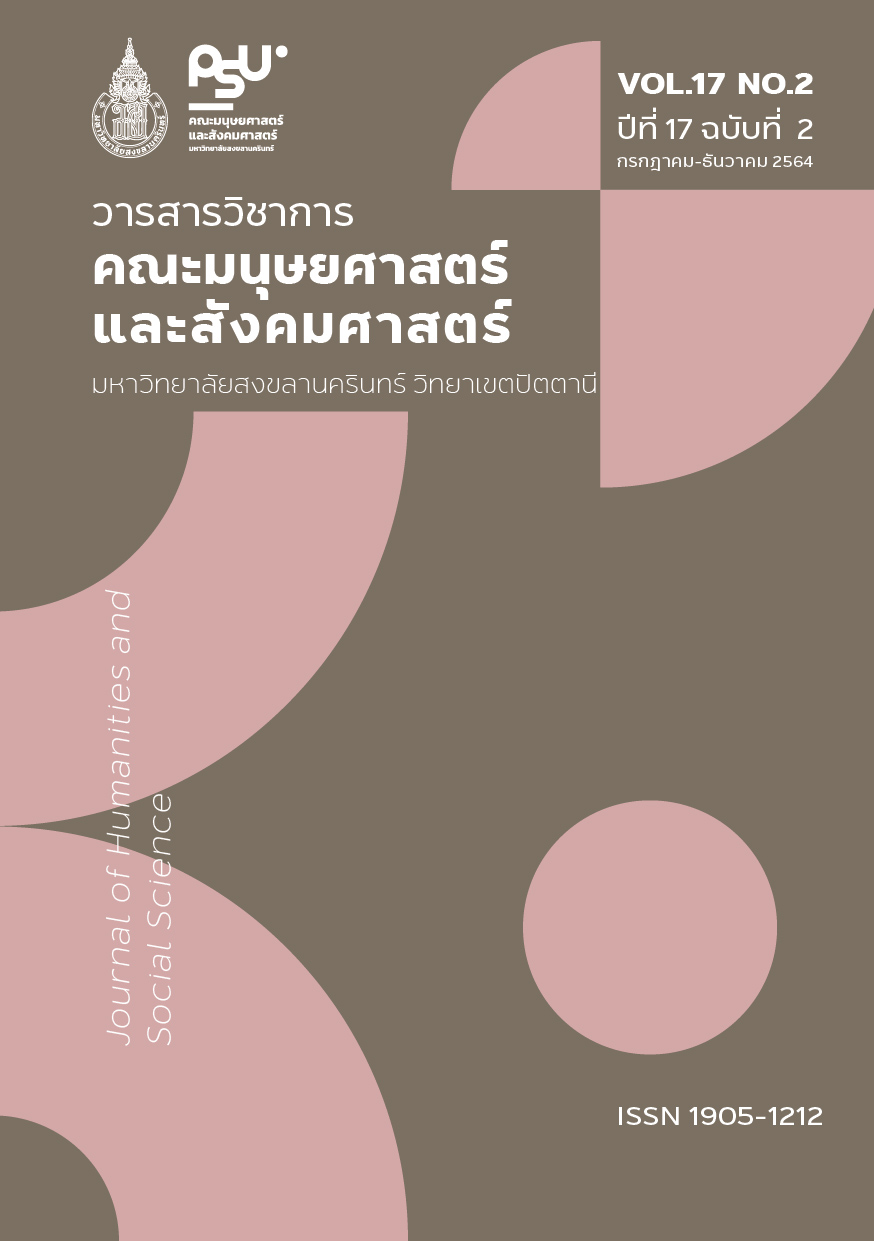Policy of Multicultural Society in Republic of Korea and Problems on Cultural Diversity
Keywords:
Multicultural society policy, Impacts of multicultural diversity, Multicultural family policy, Multicultural familyAbstract
The purposes of this research were to 1) examine problems and conflicts in multicultural families in Republic of Korea, 2) explore the relationship between the policy of multicultural family and the family conflicts, and 3) propose guidelines on multicultural family policy formulation in solving conflicts and laying the foundation of multicultural society in Republic of Korea. The primary data obtained from the Ministry of Gender Equality and Family’s survey between 2010 and 2018, the National Statistical Office, and the Ministry of Justice as well as the secondary data through reviewed literature were analyzed.
The findings were as follows.
- Different cultures, ways of life, and races as well as the lack of social support, and language barriers caused cultural conflicts, racism, and life difficulties which ended marriage of multicultural families in divorce.
- The multicultural family policy issued by the Ministry of Gender Equality and Family in 2018-2022 was compatible with the need for social and cultural adaptation in the early stages despite the following weaknesses. 1) The policy prioritized the adaptation of the aliens to the Korean cultures solely, while the sharing of knowledge and varied cultures was limited. 2) The policy were targeted only at multicultural family members rather than encouraging the community and the society to take action. 3) The foreign members of the family did not have an opportunity to participate in the Ministry of Gender Equality and Family’s projects. 4) The policy did not cover any assistance regarding divorce or separation.
- The suggested guidelines on multicultural family policy included 1) to encourage the interaction and cooperation between the families and the community in formulating a multicultural society, 2) to provide assistance in case of a divorce or separation, and 3) to design all-level curriculums containing multicultural society or foreign language and cultural studies content.
References
นิพนธ์ สมบูรณ์พูลเพิ่ม. (2556). พฤติกรรมการเสริมสร้างความเข้มแข็งด้านการจัดการทรัพยากรธรรมชาติและสิ่งแวดล้อมของผู้นำชุมชนอำเภอแม่แจ่ม จังหวัดเชียงใหม่ (วิทยานิพนธ์ปริญญามหาบัณฑิต). มหาวิทยาลัยศิลปากร, นครปฐม
แพร ศิริศักดิ์ดำเกิง. (2549). แนวคิดพหุวัฒนธรรม (Multiculturalism). ค้นจาก
อภิญญา ศิริพิทยาคุณกิจ. (2010). แรงสนับสนุนทางสังคม: ปัจจัยสำคัญในการดูแลผู้ที่เป็นเบาหวาน. รามาธิบดีสาร, 16(2), 309-322, ค้นจาก https://www.rama.mahidol.ac.th/nursing/jns/DocumentLink/2553/issue_02/10.pdf
교육부. (2018). 제 3회 유치원 교육과정 우수 사례. Retrieved from https://www.moe.go.kr/boardCnts/view.do?boardID=312&boardSeq=73172&lev=0&searchType=null&statusYN=W&page=3&s=moe&m=0301&opType=N&fbclid=IwAR2iNEyoVjrPi-6b7z5Y6O33ZSB4EPd8X6KhBiqaZFx8Bsb9P7khNv48Dtk
광영길 & 오세연. (2010). 지방의 다문화가정을 위한 지원정책에 관한 연구. 한국자치행정학보, 24(1), 217-238. Retrieved from https://www.dbpia.co.kr/Journal/articleDetail?nodeId=NODE08821991
노기호. (2013). 다문화가정 자녀의 교육기본권 실현을 위한 국가 교육정책의 방향과 과제. 법과 정책연구, 13 (4), 1,697 - 1,721. Retrieved from https://www.kci.go.kr/kciportal/ci/sereArticleSearch/ciSereArtiView.kci?sereArticleSearchBean.artiId=ART001838303
박대식 & 최경은. (2008). 농촌의 다문화가정의 실태와 정책방향 (R570). Retrieved from
법무부. (2019). 2018년도 출입국자수 사상최고기록. Retrieved from https://www.moj.go.kr/moj/221/subview.do?enc=Zm5jdDF8QEB8JTJGYmJzJTJGbW9qJTJGMTgyJTJGNDg3MzkyJTJGYXJ0Y2xWaWV3LmRvJTNGcGFzc3dvcmQlM0QlMjZyZ3NCZ25kZVN0ciUzRCUyNmJic0NsU2VxJTNEJTI2cmdzRW5kZGVTdHIlM0QlMjZpc1ZpZXdNaW5lJTNEZmFsc2UlMjZwYWdlJTNEMiUyNmJic09wZW5XcmRTZXElM0QlMjZzcmNoQ29sdW1uJTNEc2olMjZzcmNoV3JkJTNEJUVDJUI2JTlDJUVDJTlFJTg1JUVBJUI1JUFEJTI2&fbclid=IwAR1pSM1r44BCPq5jSGE41Dzl8WjHpgsRwqT_c-tacqyui8A9n1dJd8REMhM
여성가족부. (2010). 다문화가족의 해제 문제와 정책과제 (11-1383000-000005-01). Retrieved from http://www.mogef.go.kr/mp/pcd/mp_pcd_s001d.do;jsessionid=2kJ+j0EOHCr1y4wQyNU+vs9H.mogef11?mid=plc503&bbtSn=435725
여성가족부. (2019). 2018 전국다문화가족실태조사 연구 (11-1383000-000384-12). Retrieved from file:///C:/Users/USER/Dropbox/My%20PC%20(DESKTOP-LP7IFJ2)/Downloads/[%EC%B5%9C%EC%A2%85]%202018%EB%85%84%20%EC%A0%84%EA%B5%AD%EB%8B%A4%EB%AC%B8%ED%99%94%EA%B0%80%EC%A1%B1%EC%8B%A4%ED%83%9C%EC%A1%B0%EC%82%AC%20%EC%97%B0%EA%B5%AC.pdf
여성가족부. (2021). 2021년 가족사업안내. Retrieved from file:///C:/Users/USER/Dropbox/My%20PC%20(DESKTOP-LP7IFJ2)/Downloads/21%EB%85%84%20%EA%B0%80%EC%A1%B1%EC%82%AC%EC%97%85%EC%95%88%EB%82%B4_2%EA%B6%8C(%EC%B5%9C%EC%A2%85%EB%B3%B8).pdf
이민경. (2010). 한국 다문화교육정책 전개과정과 담론 분석: 교과부의 다문화가정
자녀교육지원정책(2006-2009)을 중심으로. 한국교육, 37 (2), 155-176. Retrieved from https://www.kci.go.kr/kciportal/ci/sereArticleSearch/CiSereArtiView.kci?sereArticleSearchBean.artiId=ART001467144
윤지은. (2017). 다문화가정 정책 현황 및 개선방안 연구 (석사학위논문). 건국대학교, 서울
정연희. (2008). 우리나라 다문화 이해교육의 개선방안에 관한 연구(석사학위논문). 인하대학교, 인천
조원권, 정철호, & 김수이. (2011). 글로벌 인적개발을 위한 다문화가족의 효과적인 지원 방안. Retrieved from http://kimcf.or.kr/data_old/BRD_8_1304039880_1.pdf
한승준. (2008). 프랑스동화주의 다문화정책의 위기와 재편에 관한 연구. 한국행정학보, 47 (3), 463-486. Retrieved from https://www.kci.go.kr/kciportal/ci/sereArticleSearch/ciSereArtiView.kci?sereArticleSearchBean.artiId=ART001281938
한국은행. (2021). 경제성장률. Retrieved from http://www.index.go.kr/unify/idx-info.do?idxCd=4201
통계청. (2020). 국제결혼현황. Retrieved from http://www.index.go.kr/potal/main/EachDtlPageDetail.do?idx_cd=2430
통계청. (2020). 외국인과의 이혼건수 추이 1999-2019. Retrieved from http://www.index.go.kr/potal/main/EachDtlPageDetail.do?idx_cd=2430
여성가족부. (2019). 2018다문화 관련 지원 시설 이용 경험. Retrieved from https://kosis.kr/statHtml/statHtml.do?orgId=154&tblId=DT_MOGE_1001301304&vw_cd=MT_
Thairath. (2019). รู้จัก “ซอฮยอน” สาวไทยเป็นสะใภ้เกาหลี มัดใจโอปป้า สู่ยูทูบเบอร์ชื่อดัง. ค้นจาก https://www.youtube.com/watch?v=0eJSnTl79bA&ab_channel=Thairath
Downloads
Published
How to Cite
Issue
Section
License
Copyright (c) 2021 Journal of Humanities and Social Sciences

This work is licensed under a Creative Commons Attribution-NonCommercial-NoDerivatives 4.0 International License.
บทความนี้ได้รับการตีพิมพ์เป็นของวารสารวิชาการคณะมนุษยศาสตร์และสังคมศาสตร์ คณะมนุษยศาสตร์และสังคมศาสตร์ มหาวิทยาลัยสงขลานครินทร์ วิทยาเขตปัตตานี






